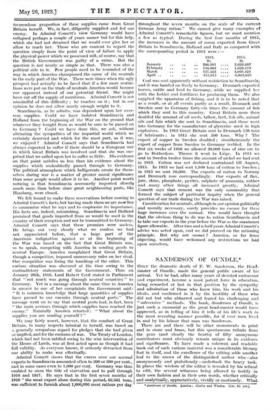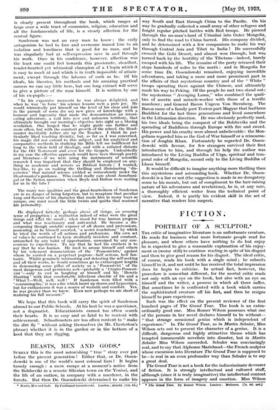SANDERSON OF OUNDLE.*
ONLY the dramatic death of P. W. Sanderson, the Head- master. of. Oundle, made the general public aware of his arrival. Yet he had, after many years of devoted endeavour and experiment, become a most potent force in education, being rewarded at last in that position by the sympathy and admiration of those who knew him, his work and his ideals, and confirmed in it by the hostility of those who did not but who abhorred and feared his challenging and "subversive " methods. The book, Sanderson of Oundle, is just such a memorial as the great head-master would have approved, as in telling of him it tells of his life's work in the most revealing manner possible, for if ever man lived in and by his labour that man was Sanderson.
There are and there will be other monuments in print and in stone and brass, but this spontaneous tribute from the pens (and clearly the hearts) of fifty anonymous contributors must obviously remain unique in its evidence and significance. To have made a coherent and readable book out of such various material was a considerable literary feat in itself, and the excellence of the editing adds another leaf to the crown of the distinguished author who—also anonymously and gratuitously—undertook the heavy task. In places the wisdom of the editor is revealed by his refusal to edit, the several witnesses being allowed to testify in their own fashion and in their own words, whether critically and analytically, appreciatively, vividly or cautiously. What_
• Sandmen of Oundle, London; Matto and Plinths. [128. 6d. net.1
is clearly present throughout the book, which ranges at large over a wide tract of economics, religion, education and all the fundamentals of life, is a steady affection for the central figure.
Sanderson was not an easy man to know ; the early antagonism he had to face and overcome inured him to an isolation and loneliness that is good for no man, and he was singularly bad at self-expression save in and through his work. Once in his confidence, however, affection was the least one could feel towards this passionate, steadfast,
tender-hearted yet whimsical champion of a Utopia which it is easy to mock at and which is in truth impossible of attain-
ment, except through the labours of such as he. Of his ideals, his theories, his methods and his amazing practical success we can say little here, but one long extract will serve to give a picture of the man himself. It is written by one of his ex-pupils :-
" In his expansive moments he was always delightful, and when he was in form' his science lessons were a pure joy. He would whimsically put himself on the level of his class and join in the pursuit of some (to us) new piece of knowledge with a humour and ingenuity that made the demonstration an intoxi- cating adventure, a raid into new and unknown territory, that ultimately brought our morning's objective into sight as a blazing revelation. One longed that he might guide one further and more often, but with the constant growth of the school, the Head- master inevitably rather ate up the Teacher. I think he par- ticularly liked teaching divinity, but, so far as I was concerned, his magic did not extend to this subject, and his analytical and comparative methods in studying the Bible left me indifferent for long to the whole field of theology, and with a satiated distaste for the Old Testament and even for the Gospels. Undoubtedly in my case the effective approach would have been through poetry and literature—if we were using the instruments of scientific research I was impatient that they should be employed on any- thing so academic and remote as Biblical history ; I wanted, boy-like, to go on making the thrilling and illuminating `dis- coveries' that natural science yielded so miraculously under the Head-master's guidance. Who could really care about Assurbani- pal or the Syrian succession when Boyle and Dalton were waiting for us in the labs ?
The many• rare qualities and the great-heartedness of Sanderson
are in no danger of being forgotten, but to recapture that peculiar tang and flavour of his character that made him in many ways so unique, one must recall the little twists and quirks that seasoned his personality. •
He display• ed latterly, perhaps above all things, an amazing
sense of pmpsrtion ; a realization indeed of what were the great things and wltat the small ; what stood for true human progress and what was reactionary and anti-social. He became a dis- composing though amiable exposer of all shams and pretensions, possessing, as he himself asserted, a secret touchstone' by which he tried the worth of all actions and professions. His own set of values he continued to keep stedfastly inviolate and constant, untouched by any taint of opportunism, unwarped by any con- cessions to expediency. To say that he had his crochets is to say that he was human. He used to amuse himself and others by his vehement denunciations of the Possessivists,' against whom he carried on a perpetual pogrom—half serious, half fan- tastic. Whilst genuinely mistrusting and detesting the self-seeking and all their works, he would sometimes go to extravagant lengths in denouncing some pillar of society as a • Possessivist ' of the most dangerous and pernicious sort—probably a Crypto-Possessi- vist '—only to end in laughing at himself and his Heretic Hunting' with that comfortable infectious chuckle of his and a What I—Well, well, well ! ' If Sanderson were filled with a ' consuming fire,' it was a fire which burnt up shams and hypocrisies, but for enthusiasms it was a source of warmth and comfort. Yes, he was greater than we knew. Even now perhaps we are short of realizing his full measure."
We hope that this book will carry the spirit of Sanderson abroad to our Public Schools. At his best he was a questioner, not a dogmatist. Educationists cannot too often search their hearts. It is so easy and so fatal to be content with achievement. Schoolmasters are too often content to " make the dirt fly " without asking themselves (in Mr. Chesterton's phrase) whether it is in the garden or in the bottom of a boot that they are digging.











































 Previous page
Previous page